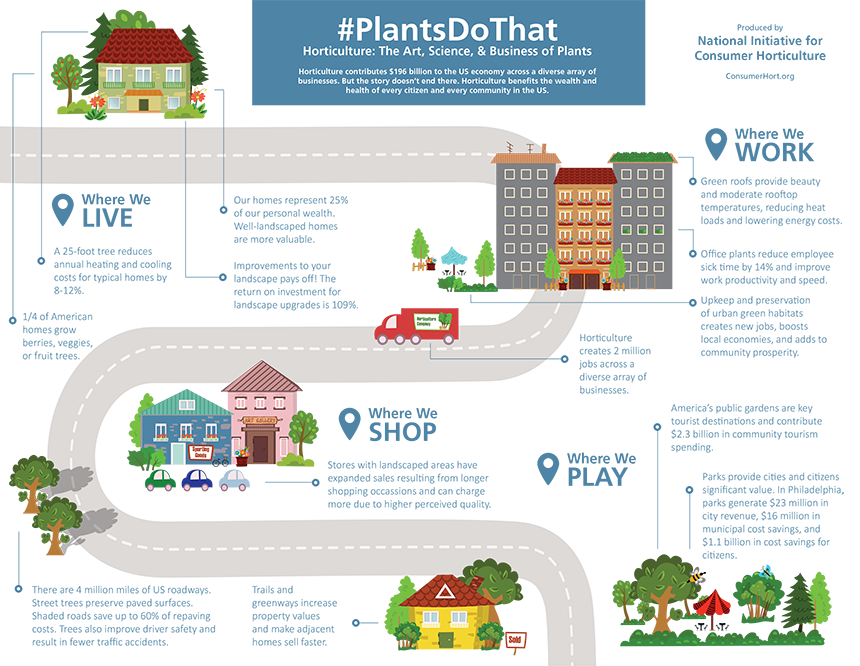The Power of Plants in Promoting Human Well-Being
During this time of limited social interactions, overwhelming news and the directive to stay at home, it is perhaps more important than ever to unplug here and there and connect with nature. Even just getting outside into your yard, garden or onto your balcony to sit, undistracted, and take in the trees, the grass, and the early signs of spring can lower your stress and bring a sense of calm. This isn’t hyperbole—it has been scientifically studied and proven. Read on to learn more. (This post was originally published on December 18, 2019.)
Plants provide economic, environmental and health benefits that sustains life on Earth. They are integral to human well-being providing food, fiber, medicine, feed & forage, industrial material and ornamental and cultural services. With rapid human population growth and urbanization, many urban dwellers have lost touch with plants and nature, which has detrimental effects on overall individual and community health and well-being. Research has documented the power of plants in enhancing the quality of life, positively influencing our physical, psychological, social, environmental, cognitive and spiritual well-being, the six main components of quality of life.
Humans have an innate love for the natural world, thriving when surrounded by living organisms. These connections that human beings subconsciously seek with the rest of life is termed as Biophilia. This is evolutionarily embedded in our psyche. In almost every culture, both past and present, the fondness for nature can be seen reflected in human behavior. Gardens to support the healing process were an essential part of the first hospitals in Europe, which were infirmaries in monastic communities. Incorporating plants and nature in our lives can significantly reduce the negative effects of urbanization—evidence can be seen in cities where we line streets with trees and build parks to improve the environment.
In order to address the disconnect that current urban society has with plants and nature, the National Initiative for Consumer Horticulture was formed. The goal of this organization is to engage consumers in horticulture and educate them about the power of plants in promoting human well-being. By communicating the benefits of gardening and horticulture through master gardeners and public gardens, they aim to reach a wide audience. To achieve this, they have developed a series of educational posters with the hashtag Plants Do That (#PlantsDoThat).

Here are some of the economic, environmental and health & well-being benefits of plants:
Economic:
- Increased property values
- Energy savings
- Tourism revenue
- Job creation
- Reduced health care costs
Environmental:
- Reduction in noise pollution
- Improved water quality through reduced storm water run-off
- Carbon sequestration and improved air quality
- Attract wildlife and promote biodiversity
- Offset heat islands
- Reduced soil erosion
Health & Well-Being:
- Reduced anxiety and stress
- Attention deficit recovery
- Decreased depression
- Better sleep
- Enhanced memory retention
- Greater happiness and life satisfaction
- Mitigation of post-traumatic stress disorder (PTSD)
- Decreased diabetes
- Enhanced immunity
- Increased creativity
- Enhanced productivity and attention
- Reduced effects of dementia
- Improved self-esteem
- Improved rehabilitation
- Lower cardiovascular disease risk and blood pressure
- Obesity reduction
- Positive cognitive development
- Accelerated healing process
- Reduced crime
References:
- Hall, C.R. and M.W. Dickson. 2011. Economic, environmental, and health/well-being benefits associated with green industry products and services: a review. Journal of Environmental Horticulture. 29(2): 96-103.
- Hall, C. and M. Knuth. 2019a. An update of the literature supporting the well-being benefits of plants: A review of the emotional and mental health benefits of plants. Journal of Environmental Horticulture. 37(1): 30-38.
- Hall, C. and M. Knuth. 2019b. An update of the literature supporting the well-being benefits of plants: Part 2 physiological health benefits. Journal of Environmental Horticulture. 37(2): 63-73.
Add new comment